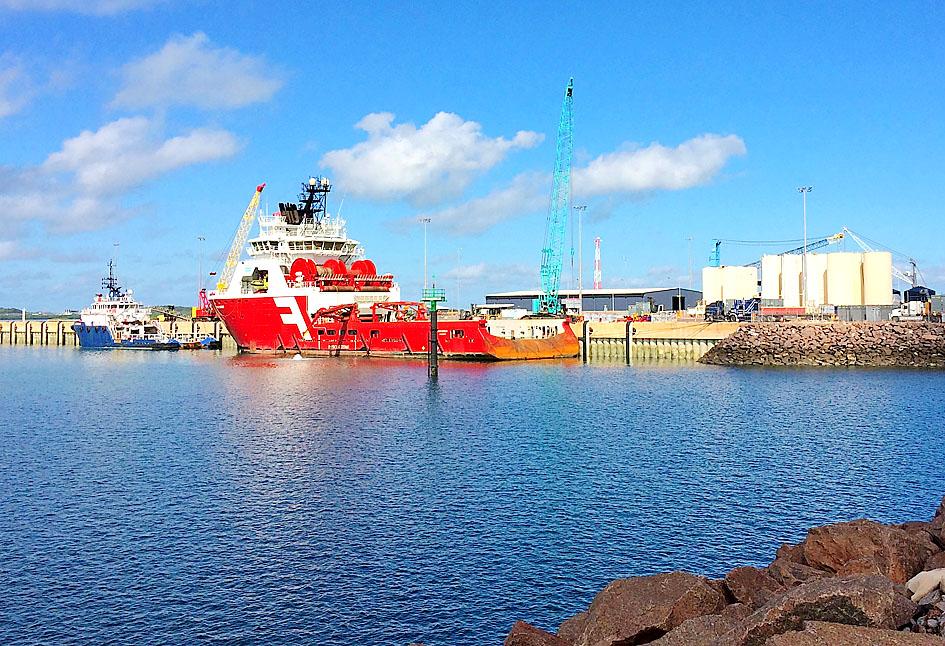Australia is reviewing whether to force a Chinese company to sell a lease to a strategically important port used by US Marines, a move that could further stoke tensions with Beijing.
The National Security Committee of Australian Prime Minister Scott Morrison’s Cabinet has asked the Department of Defence to advise on the ownership, Australian Minister of Defence Peter Dutton said in an interview with the Sydney Morning Herald published late on Sunday.
Asked whether the government was mulling forced divestment, he said officials would consider the national interests.

Photo: Reuters
The move is likely to further hurt ties between Australia and its largest trading partner, which have nosedived since the call by Morrison’s government a year ago for Beijing to allow independent investigators into Wuhan to probe the origins of the COVID-19 pandemic.
Since then, China has implemented a range of trade actions against Australian goods, including coal, wine and barley.
The Northern Territory government’s deal in 2015 to sell a 99-year lease to the Port of Darwin to Chinese firm Landbridge Group (嵐橋集團) for A$506 million (US$392 million) has been criticized by security experts.
It came four years after then-US president Barack Obama secured a deal to base about 2,500 Marines in Darwin, which is on the doorstep of the Indo-Pacific region.
In December 2015, the Australian Department of Defence dismissed concerns that the sale could undermine national security after the US queried the deal.
Then-Australian secretary of defence Dennis Richardson said that worries the Chinese People’s Liberation Army could secure access to port facilities were “alarmist nonsense,” adding that there was no chance of China spying on US-Australian communications because naval vessels go silent in any commercial port.
“Australia may be thinking its stocks with China are so low at the moment that it may as well do this now,” said John Blaxland, a former intelligence officer who is now a professor in international security at the Australian National University. “While the efficacy of this course of action is unclear, it is possible intelligence officials have briefed the government that risks from China’s ownership now merit a reversal of the sale.”
China slammed Australia’s decision last month to use new laws to cancel Belt and Road agreements with the Victorian state government.
There has been increasing speculation Morrison might use the laws, passed in December last year, to scrap long-term leases held by Chinese companies at the ports in Darwin and Newcastle.
“In relation to the Port of Darwin, if there is any advice that I receive from the Department of Defence or intelligence agencies that suggest there are national security risks there, then you would expect the government to take action on that,” Morrison said in a radio interview on Friday.

CARROT AND STICK: While unrelenting in its military threats, China attracted nearly 40,000 Taiwanese to over 400 business events last year Nearly 40,000 Taiwanese last year joined industry events in China, such as conferences and trade fairs, supported by the Chinese government, a study showed yesterday, as Beijing ramps up a charm offensive toward Taipei alongside military pressure. China has long taken a carrot-and-stick approach to Taiwan, threatening it with the prospect of military action while reaching out to those it believes are amenable to Beijing’s point of view. Taiwanese security officials are wary of what they see as Beijing’s influence campaigns to sway public opinion after Taipei and Beijing gradually resumed travel links halted by the COVID-19 pandemic, but the scale of

TRADE: A mandatory declaration of origin for manufactured goods bound for the US is to take effect on May 7 to block China from exploiting Taiwan’s trade channels All products manufactured in Taiwan and exported to the US must include a signed declaration of origin starting on May 7, the Bureau of Foreign Trade announced yesterday. US President Donald Trump on April 2 imposed a 32 percent tariff on imports from Taiwan, but one week later announced a 90-day pause on its implementation. However, a universal 10 percent tariff was immediately applied to most imports from around the world. On April 12, the Trump administration further exempted computers, smartphones and semiconductors from the new tariffs. In response, President William Lai’s (賴清德) administration has introduced a series of countermeasures to support affected

Pope Francis is be laid to rest on Saturday after lying in state for three days in St Peter’s Basilica, where the faithful are expected to flock to pay their respects to history’s first Latin American pontiff. The cardinals met yesterday in the Vatican’s synod hall to chart the next steps before a conclave begins to choose Francis’ successor, as condolences poured in from around the world. According to current norms, the conclave must begin between May 5 and 10. The cardinals set the funeral for Saturday at 10am in St Peter’s Square, to be celebrated by the dean of the College

CROSS-STRAIT: The vast majority of Taiwanese support maintaining the ‘status quo,’ while concern is rising about Beijing’s influence operations More than eight out of 10 Taiwanese reject Beijing’s “one country, two systems” framework for cross-strait relations, according to a survey released by the Mainland Affairs Council (MAC) on Thursday. The MAC’s latest quarterly survey found that 84.4 percent of respondents opposed Beijing’s “one country, two systems” formula for handling cross-strait relations — a figure consistent with past polling. Over the past three years, opposition to the framework has remained high, ranging from a low of 83.6 percent in April 2023 to a peak of 89.6 percent in April last year. In the most recent poll, 82.5 percent also rejected China’s